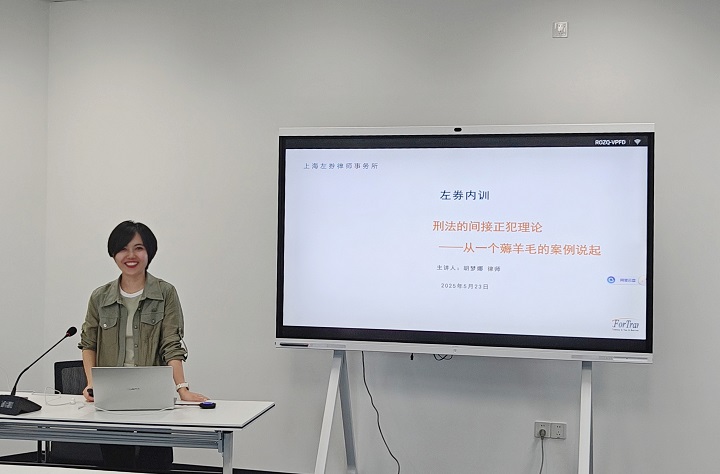On May 23, 2025, Shanghai ForTran Law Firm held a specialized training session titled “Indirect Perpetration in Criminal Law: A Case Study of Insurance Arbitrage.” The session was led by Ms. Mona Hu and offered a vivid and insightful exploration of contemporary issues at the intersection of criminal law theory and practice.
On May 23, 2025, Shanghai ForTran Law Firm held a specialized training session titled “Indirect Perpetration in Criminal Law: A Case Study of Insurance Arbitrage.” The session was led by Ms. Mona Hu and offered a vivid and insightful exploration of contemporary issues at the intersection of criminal law theory and practice.
The training centered around a landmark case successfully defended by Ms. Hu involving regulatory arbitrage through insurance products. The defendant orchestrated a scheme involving manipulated agency relationships, self-insurance, commission rebates, and policy cancellations to induce over 20 individuals to purchase insurance policies, thereby generating excessive rebates and policy-based returns. During the investigation, prosecution, and trial phases, the case underwent multiple recharacterizations, being considered at various points as either fraud or contract fraud.
Drawing upon comparable cases—including fraudulent claims involving flight delay insurance and subsidy arbitrage in agricultural machinery programs—Ms. Hu examined the fine line between exploiting legal loopholes and engaging in criminal conduct. KShe provided an in-depth analysis of how such schemes should be legally characterized, the methodologies for calculating the amount of fraud, and the application of the indirect perpetrator theory in practice.
Ms. Hu also shared valuable litigation strategies from the case, including how the defense successfully persuaded the court to adopt key arguments, resulting in the defendant’s release on bail and a significantly reduced sentence. The presentation sparked lively discussion among attendees.
The training was met with enthusiastic feedback. It deepened the participants' understanding of indirect perpetration theory and enhanced their sensitivity and professional judgment in assessing criminal liability arising from complex commercial and financial conduct. Many expressed that this integration of doctrinal theory with emerging criminal law issues was both timely and highly beneficial, and looked forward to future sessions of similar depth and relevance.



